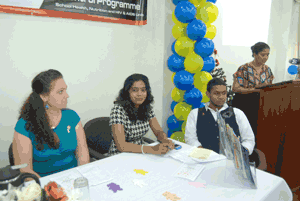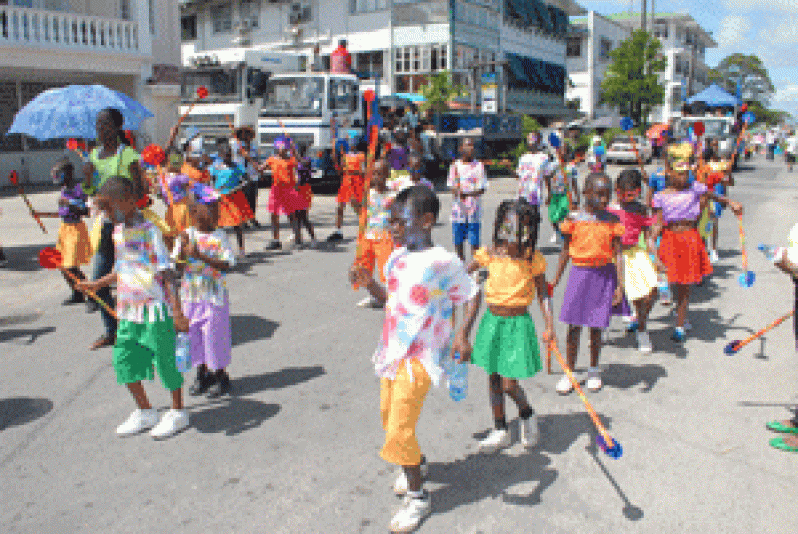 Giving an overview of the project, Peace Corps Response Volunteer Lindsay Kurth said the 41 youth educators who will participate in the project come from various regions across the country, and that she is very proud of all of them for the hard work they put in over the course of their one-week training
Giving an overview of the project, Peace Corps Response Volunteer Lindsay Kurth said the 41 youth educators who will participate in the project come from various regions across the country, and that she is very proud of all of them for the hard work they put in over the course of their one-week training
She disclosed that some of the sessions included the basics of HIV and Aids; what a youth educator is; how to be an effective and proficient youth educator; and hands-on experience in both primary and secondary schools.
According to Ms. Kurth, the goals of the YES project are: to build the capacity of in-school youth through education of YES volunteers; replace risky behaviour with healthy behaviour; and zero new HIV infections for in-school youths.
She noted that the next step will be for the young volunteers to receive a packet, which includes teaching aids and a manual to cover both primary and secondary schools, and a guide book which will take the young volunteers through various lessons that cover a broad range of topics, including information about HIV and Aids and other sexually transmitted diseases.
Ms Kurth related that the volunteers will then take these packets into mutual capacity-building, one-hour- per-week sessions with Grades 5, 6 and 9 students. She added that these volunteers have made a commitment to devote one academic year to volunteer service.
 Making brief remarks at the launch, Programme Manager of the National Aids Programme Secretariat (NAPS), Dr. Shanti Singh, said the Human Immunodeficiency Virus (HIV) has been discovered more than three decades ago, so everybody, youths in particular, should beware of its danger. She noted that during this year, 49.1% of all new cases of HIV in Guyana involved youths between the ages of 15 and 34 years old, and added that this means that one in every two persons infected for 2011 was a youth.
Making brief remarks at the launch, Programme Manager of the National Aids Programme Secretariat (NAPS), Dr. Shanti Singh, said the Human Immunodeficiency Virus (HIV) has been discovered more than three decades ago, so everybody, youths in particular, should beware of its danger. She noted that during this year, 49.1% of all new cases of HIV in Guyana involved youths between the ages of 15 and 34 years old, and added that this means that one in every two persons infected for 2011 was a youth.
According to a 2009 survey, Dr Singh disclosed, Guyanese young people are sexually active from as early as 14 years old, and if the age range were to be examined, the emerging pattern would suggest that some people commenced sexual activity from as early as 6 years old.
She disclosed that half of the sexually active youths use a condom, and as such, one in every two sexually active youths would use a condom.
Meanwhile, Dr. Singh related that Guyana joins the rest of the world in observing World AIDS Day 2012, and that the Global report from the United Nations (UN) highlighted that the world has reduced new infections.
She added that the majority of those reductions actually came because of good prevention programmes in the mother-to-child programme, allowing our exposed babies to be born without HIV.
She challenged everyone to recommit to zero new infections, especially our young people.
Giving the feature address at the launch, Chief Education Officer Mr. Olato Sam said the name of the project itself speaks volumes; and that, in essence, what these youths are going to be doing is ensuring and safeguarding our workforce for the future.
He opined that due recognition should be given to these young volunteers, who would have enlisted in this training programme to ensure that they can disseminate the message far and wide across all the regions of this country, and to ensure that the broad objectives are met.
Sam told the young volunteers it’s very important they should internalize the tremendous responsibility that is being placed on their shoulders. “You are now our ambassadors, you are going out into the trenches, I should say, to try to address an issue that’s of national significance,” he emphasised.
He further stated that if the volunteers could appreciate that fact and recognize that this is a call to serve, they are in essence giving very valuable service to this nation to begin to address something that is in epidemic proportions globally, and is certainly one of the major concerns from a national developmental perspective.
Sam noted it is his view that preservation of our youth certainly ranks very high on any agenda, especially on the agenda of the Ministry of Education. He added that many young people are being introduced to sexual activity, and that much sooner, therefore a more appropriate group of people couldn’t be found to identify with the population they’re targeting.
“People who can relate to the people giving the message are easier influenced to change their behaviour; and I think if anyone can change the behaviour of our young people, it’s young people themselves,” he asserted.
He urged the young volunteers to use their own experiences and the exposure they would have had in their own communities to their benefit, and asked them to then transfer that into a well-structured message that can help them to help the young people.
According to him, if we’re going to move education forward, if we’re going to move to broaden the agenda in relation to these very issues of significance and national developmental proportions, the single ministries can’t do it.
“It’s a collaborative effort such as this that would help us to get to the next level, so I certainly would like to applaud our partners in this, the Peace Corps and the volunteers who have been working with us,” he emphasised.
The youth educators received certificates for their participation in the one-week training programme, after which they took the oath which officiated them as youth educators.



.jpg)








